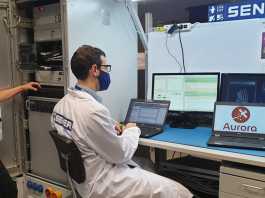Craig Brown, Director of Investment at the UK Space Agency, explains how the Agency is working to tackle some of the world’s greatest challenges through innovation in space technology.
From satellites to propulsion systems, space technologies are vital to the everyday functioning of modern society. As societal and economic problems, such as climate change and the energy crisis prevail, continuous innovation in space technology is essential to address and offer solutions to such major issues.
In the UK, the UK Space Agency has shown a solid commitment to supporting innovative space technology projects, both nationally and across the globe, with the launch of its National Space Innovation Programme (NSIP) in 2020. The programme ran two funding opportunities for project teams to advance their innovative products, services, and technologies that have applications in the space sector.
As part of the NSIP, the UK Space Agency also launched the Enabling Technologies Programme (ETP), which is a national funding programme providing opportunities to the UK space industry for emerging research in space technology across the UK. The ETP is open to UK industry, academia, and other research organisations to build UK capability by supporting the space industry. The programme has released a series of different funding calls aimed at targeting different issues.
Most recently, the Agency announced a funding injection of £2.1m to boost innovation in space technologies in areas such as solar power and new propulsion systems.
Editor Georgie Purcell spoke to Craig Brown, Director of Investment at the UK Space Agency, to learn more about the ETP and the importance of innovation in space technology.
Why is innovation in space technology such an important part of the UK space programme?
Innovation in space technology is fundamental to everything that we do, and accelerating innovation in space technology across the globe is central to almost all programmes across the UK Space Agency. Every space programme and project that we are involved in has innovation at its core.
Innovation is important for a number of reasons. Firstly, it is about progressing our understanding and knowledge of the Universe, and enhancing the way in which we use space assets and space data to deliver new types of services to improve our understanding of the world. If we are to improve our knowledge of our planet and Universe, we must continue to evolve and improve what we are doing.
Secondly, and importantly for me as the Director of Investment, is the economic benefit. We are in a global race to deliver commercial applications in the space domain and, to ensure that the UK stays at the forefront of the global space economy, we must continue to push innovation in space technology to deliver new commercial services. If we stand still, we will quickly lose that race because everybody else is running.
The UK Space Agency has recently announced funding to boost UK-based space technologies as part of its Enabling Technologies Programme. Why is this needed and what is it hoped that it will achieve?
Our Enabling Technologies programme is a £15m programme in total, and the £2.1m that was announced in June is the first phase of that. The programme is really interesting because it focuses on the very early stages of development.
We themed the recent call around a couple of important areas, including solar technologies and propulsion systems. The plan with the ETP is to change the theme with each call, so as to tackle different areas each time. Those themes are focused on areas that are indicated to enable large economic opportunities in the future. This programme ensures that we have the right space technology in place to address those issues in five to ten years’ time.
We also have many other programmes that aren’t themed or are themed in broader ways. For example, we have a telecommunications programme and a navigation programme, where companies are free to submit their ideas along those broader themes. Again, these programmes are developed with long-term economic benefits in mind, to ensure that the UK industry is well positioned to deliver against some of those big markets.
Can you elaborate on the different areas of space technology that the ETP is targeted at?
The scale and scope of the programme is really broad and is designed to tackle multiple key technologies to address different challenges across space.
Innovation in space technology includes everything from the big problems in society, such as getting to net zero and making sure that we have a secure energy supply for the future, to ensuring that we have the right technology on a spacecraft to keep satellites in orbit for longer and do those things in a cheaper, safer, and more sustainable way.
Sustainability is very key to what we do; making sure that the orbital environment is sustainable so that we can continue using it for generations to come and that it doesn’t become an unintentional ‘orbital junkyard’. Ensuring that we are feeding into net zero goals and global energy security is something that we’re looking at very seriously at the Agency.
How can space technologies help to address the wider challenges within the UK?
This goes to the heart of why governments are interested in using space. Beyond the economics, the societal benefits of the use of space are undeniable. Looking at climate change, for example, more than 50% of fundamental climate change metrics can only be measured from satellites. Therefore, without space activities, we would only see half the picture when it comes to monitoring and tackling climate change.
Space also has a huge amount of benefits in terms of navigating life on this planet. It is easy to forget just how important satellites and satellite services are to people and the way in which we go about our daily lives.
Space technologies are also changing the way in which we communicate. We have an expectation that we will have access to broadband internet in all areas and at all times. However, this is often not the case due to poor signal. Satellites will have a really important part to play in the future in making sure that we’re filling all these ‘notspots’ to make sure that we can communicate wherever we are.
Is there likely to be any more related funding announced as part of the ETP?
Absolutely. The Enabling Technologies Programme will be repeated. Currently, we have agreements to spend around £5m a year with the programme and we hope and intend to continue that programme over time, as well as expanding it.
Currently, the ETP addresses the very early stages of development – what we refer to as low technology readiness levels (TRLs). We are, however, hoping to extend that programme further through the National Space Innovation Programme, subject to approvals, to make sure that projects that address higher technology readiness levels also have a home within the Agency.
In total, about 70% of the UK Space Agency’s money is spent in collaboration with the European Space Agency (ESA). We have significant programmes across the European Space Agency that also support these technology developments. That £2m is just a drop in the ocean of what we spend. If you look at the ESA budget, we invested £1.6bn over five years, which included £217m for exploration, £71m for technology, £207m for telecommunications and commercial applications, £314m for Earth observation and £111m for space safety.
Last week, for example, we announced a £20m funding programme through ESA to develop connectivity services for aerial platforms like drones. There are always opportunities for businesses that are in or new to the space sector to work with us to push forward new innovation in space technology. We are always happy to help people understand how to access that money, they just need to contact us and we can point them in the right direction.
Please note, this article will also appear in the fifteenth edition of our quarterly publication.









